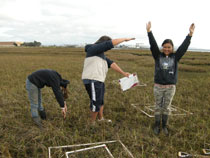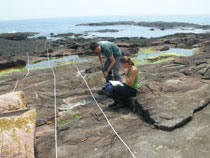Renee Dolecal
rdolecal@gmail.com - C.V.

|
My research investigates chemically-mediated trophic interactions in rocky intertidal and subtidal ecosystems in Southern California. Specifically, I am interested in the chemical cues produced by seaweeds and their affect on tritrophic interactions. For example, many seaweed species produce chemical deterrents that render them unpalatable, thereby directly reducing consumption by herbivores. However, what is unknown is if chemicals produced by seaweeds, either indirectly upon consumption or directly through other mechanisms, have the ability to influence higher trophic levels. Chemosensitive predators adapted to detecting and tracking such potential “alarm cues” in aquatic environments could greatly benefit seaweeds by indirectly acting as a form of defense by removing herbivores. Otherwise known as the “bodyguard hypothesis” in terrestrial studies, these interactions can strongly influence trophic relationships and community structure in marine ecosystems. By conducting both laboratory and large-scale field experiments, I hope to determine the prevalence of seaweed-predator tritrophic interactions and their consistency through both space and time. |
|
Emily Jones
emjones@gmail.com - C.V.

|
My general research questions focus on how marine communities are structured, with an emphasis on seaweed-herbivore interactions, positive interactions, the causes and consequences of biodiversity, and how species interactions vary in space and time. I am entering the Joint-Doctoral Program in Ecology (SDSU and UC Davis) in Fall 2010. For my doctoral research, I am particularly interested in how variation in intertidal grazing regimes (e.g. herbivore diversity, grazing intensity, herbivore selectivity) affects seaweed community structure and function across environmental gradients. The goals of my research are to tease apart the effects of herbivory and environmental variation on intertidal communities, while tying these underlying mechanisms together with ecosystem responses. |
|
Chris Kwan
chrkwan@ucdavis.edu - C.V.

|
I am interested in studying chemical communication among marine organisms and how these interactions may affect community dynamics or the role environmental factors such as pollutants play in these relationships. Using lab and field experiments, I hope to incorporate different types of marine organisms and trophic levels in my studies to provide a clearer perspective on the influences of chemical cues in shaping community structure. |
|
Alex Warneke
a.warneke@yahoo.com - C.V.

|
The release of potentially toxic compounds into the environment such as polychlorinated biphenyls, polycyclic aromatic hydrocarbons, phthalates, alkylphenols, organotins, and bisphenols threaten aquatic ecosystems worldwide. These compounds have been shown to negatively influence survivorship, growth and reproduction of algae, invertebrates, fish, birds and humans at realistic concentrations. Beyond these demographic effects, however, few studies have examined their consequences on trophic dynamics, such as consumer-prey interactions. I am primarily interested in the roles that such persistent anthropogenic chemicals, may be playing in disrupting the chemical interactions between biological organisms. Feel free to follow the progress of my research at https://sites.google.com/site/amwarneke/home or on the Twitter @Alex_Warneke. |
|
|





